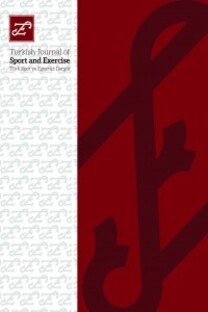Rekreatif Faaliyetlere Katılan 9-14 Yaş Grubunun Benlik Saygısı ve Sosyalleşme Düzeylerinin İncelenmesi
Bu çalışmanın amacı; rekreatif faaliyetlere katılan 9-14 yaş grubunun benlik saygısı ve sosyalleşme düzeylerinin incelenmesidir. Araştırmanın evrenini 2016-2017 eğitim-öğretim yılı Konya ili Karatay, Meram ve Selçuklu ilçelerindeki devlet ortaokullarında 5., 6., 7. ve 8. Sınıflar da öğrenim gören 87.814 öğrenci oluşturmaktadır. Araştırmanın örneklemini ise; evren gurubundan tesadüfi yöntemle seçilmiş, 1204 öğrenci oluşturmaktadır. Araştırmada belirlenen amaçlara ulaşabilmek için kişisel bilgi formundan, Benlik Saygısı Ölçeğinden ve Sosyalleşme Boyutundan yararlanılmıştır. Verilerin analizinde ise; bağımsız grup t testi, frekans ve yüzde dağılımları, tek yönlü varyans analizi (ANOVA), post-hoc LSD veya Tamhane’nin T2 testleri ve Pearson çarpım moment korelasyon analizi kullanılmıştır. Sonuçların yorumlanmasında p< 0.05 anlamlılık düzeyi kabul edilmiştir. Araştırma bulgularında kız öğrencilerin benlik saygılarının erkek öğrencilere göre daha yüksek olduğu, öğrencilerin yaşları ilerledikçe kendilerine yetme düzeylerinde artış olduğu ve anne-baba eğitim düzeyi arttıkça öğrencilerin benlik değeri, özgüven, başarma ve üretkenlik düzeylerinin de arttığı sonucuna ulaşılmıştır. Yine yüksek sosyo-ekonomik seviyeye sahip bireylerin daha yüksek benlik saygısı puanlarına sahip oldukları gözlenmiştir. Sosyalleşme ile ilgili olarak ise kız öğrencilerin sosyalleşme düzeylerinin erkek öğrencilere göre daha yüksek olduğu, anne-baba eğitim ve gelir düzeyleri arttıkça öğrencilerin sosyalleşme düzeylerinin de arttığı sonucuna ulaşılmıştır. Rekreatif faaliyetler için harcanan zamanın benlik saygısı ve sosyalleşme düzeylerini olumlu yönde etkilediği sonucuna ulaşılmıştır.
Examining Self-Esteem and Socialization Levels of The Students Aged 9-14 Participating in Recreational Activities
The aim of this study is to examine the self-esteem and socialization levels of the students aged 9-14 participating in recreational activities. The population of the study is comprised of 87.814 students attending 5th, 6th, 7th, and 8th grades in public schools in Meram and Selçuklu districts of Konya province in the 2016-2017 academic year. The sample of the study is comprised of 1204 students who were randomly selected from among the research population. In order to reach the predetermined objectives of the study, the Personal Information Form, Self-Esteem Scale, and Socialization Dimension were used. In the analysis of the data, independent group t test, frequency and percentage distributions, one-way variance analysis (ANOVA), post-hoc LSD, T2 tests of Tamhane, and Pearson product moment correlation analyses were used. In the interpretation of the results, the significance level was accepted as p< 0.05. Among the findings of the study, it was concluded that the self-esteem levels of female students were higher compared to the males, their self-sufficiency levels increase as their ages progress, and the self-value, self-confidence, achievement and productivity levels of students increase as the parental education level increases. It was also observed that individuals with high socio-economic levels have higher self-esteem scores. In relation to socialization, it was concluded that the socialization levels of female students were higher than male students, and that the socialization levels of the students increased as their parental education and income levels increased. It was concluded that the time spent for recreational activities positively affect self-esteem and socialization levels.
___
- 1. Akyol AK. Yatılı ve gündüzlü okuyan çocukların benlik kavramlarının ve sosyal destek algılarının incelenmesi. Kastamonu Eğitim Dergisi, 2013; 21 (4-Özel Sayı): 1377-1398.
- 2. Altınköprü T. Genç Kız Psikolojisi ve Cinselliği. İstanbul: Hayat Yayıncılık, 2001.
- 3. Arıcak OT. Grupla Psikolojik Danışma Yoluyla Benlik Saygısı ve Mesleki Benlik Saygısının Geliştirilmesi. Marmara Üniversitesi, Sosyal Bilimler Enstitüsü, Doktora Tezi, İstanbul, 1999.
- 4. Aslan E. Benlik kavramı ve bireyin yaşamındaki etkileri, İstanbul: Marmara Üniversitesi Atatürk Eğitim Fakültesi Eğitim Bilimleri Dergisi, 1992; 4 (4): 7-14.
- 5. Aşçı FH, Gökmen H, Tiryaki G, Aşçı A, Zorba E. Sportif katılımın liseli erkek öğrencilerin beden bölgelerinden hoşnut olma düzeyleri üzerine etkisi, Spor ve Performans Dergisi, 1993; 4 (3): 38-47.
- 6. Aytan Korucu G. Ortaöğretim Öğrencilerinin Sosyalleşmelerinde Sporun Etkileri. Gazi Üniversitesi, Yayınlanmamış Doktora Tezi, Ankara, 2010.
- 7. Dodson F. Çocuk Eğitim El Kitabı (Çev: A. Durmaz). İstanbul: Ravza Yayınları, 2007.
- 8. Erdoğdu M, Koçyiğit M, Çınar M, Uyar M. Kişilerarası iletişim bağlamında rekreatif faaliyetlere katılan üniversite öğrencilerinin benlik saygısı ve sosyalleşme düzeyleri arasındaki ilişkinin incelenmesi. İletişim Kuram ve Araştırma Dergisi. 2018; 47: 508-523
- 9. Göksel AG. Anadolu lisesi öğrencilerinin beden eğitimi dersine yönelik tutumlarının incelenmesi. Marmara Üniversitesi Spor Bilimleri Dergisi, 2016; 1 (1); 1-9.
- 10. Gül SK, İsmail DG. Ergenlik dönemi sorunları ve şiddet, Afyonkarahisar: Afyon Kocatepe Üniversitesi Sosyal Bilimler Dergisi, 2009; 11 (1): 79-101.
- 11. Güleç H, Ceylan ÖA. Öğretmen adaylarının benlik saygıları ve mesleki benlik saygılarının çeşitli değişkenler açısından incelenmesi. Bartın Üniversitesi Eğitim Fakültesi Dergisi, 2017; 6 (2): 556-579
- 12. Kahriman İ. Karadeniz teknik üniversitesi Trabzon sağlık yüksekokulu öğrencilerinin benlik saygıları ve atılganlık düzeylerinin bazı değişkenler açısından incelenmesi. Cumhuriyet Üniversitesi Hemşirelik Yüksekokulu Dergisi, 2005; 9 (1): 24-32.
- 13. Kandır A, Orçan M. Beş-altı yaş çocuklarının erken öğrenme becerileri ile sosyal uyum ve becerilerinin karşılaştırmalı olarak incelenmesi. İlköğretim Online, 2011; 10 (1): 40-50.
- 14. Karaküçük S. Rekreasyon: Boş Zamanları Değerlendirme, Ankara: Gazi Kitabevi, 2005.
- 15. Kılbaş Ş. Rekreasyon Boş Zamanı Değerlendirme, Adana: Anaca Yayınları, 2001.
- 16. Korkmaz NH. Yaz spor okulları ile çocukların benlik saygısı arasındaki ilişki. Uludağ Üniversitesi Eğitim Fakültesi Dergisi, 2007; 20 (1): 49-65.
- 17. Kurar İ, Furkan B. Halkın boş zaman değerlendirme alışkanlıkları: Alanya örneği, Antalya: International Journal of Science Culture And Sport, 2014, 2 (Özel Sayı 2): 39-52.
- 18. Mullıs KA, Mullis RL, Normandin D. Cross-Sectional and Longitudinal Comparisons of Adolescent Self Esteem. Adolescence, 1992; 27: 51-60
- 19. Şahan H. Üniversite Öğrencilerinin Sosyalleşme Sürecinde Spor Aktivitelerinin Rolü. Selçuk Üniversitesi, Sosyal Bilimler Enstitüsü, Doktora Tezi, Konya, 2007.
- 20. Yetim A. Sosyoloji ve Spor. Ankara: Topkar Matbaacılık, 2000.
- Başlangıç: 1999
- Yayıncı: Selçuk Üniversitesi, Spor Bilimleri Fakültesi
Sayıdaki Diğer Makaleler
Davut ATILGAN, Yalçın TÜKEL, Abdullah Sencer TEMEL
Sıla ATALAYIN, Hürmüz KOÇ, Hüseyin Özden YURDAKUL
Economic Determinants of Success in Olympic Games
Seyed-nezamuddin MAKİYAN, Mojtaba ROSTAMİ
Mohammadbagher FORGHANİ OZRUDİ, Somayeh FAGHANPOUR, Roghayeh GHOLAMPOUR GOLİ
